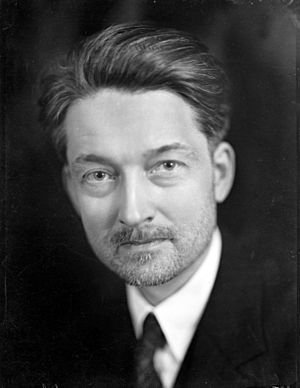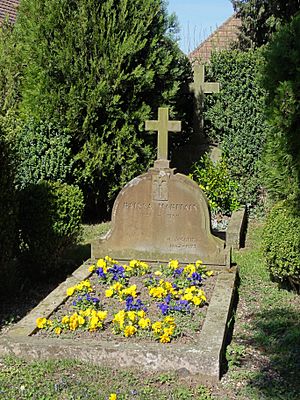Jacques Maritain facts for kids
Quick facts for kids
Jacques Maritain
|
|
|---|---|

Maritain in the 1930s
|
|
| Born | 18 November 1882 Paris, France
|
| Died | 28 April 1973 (aged 90) Toulouse, France
|
| Alma mater | University of Paris |
|
Notable work
|
|
| Spouse(s) |
Raïssa Maritain
(m. 1904; died 1960) |
| Era | 20th-century philosophy |
| Region | Western philosophy |
| School | Existential Thomism |
|
Main interests
|
|
|
Influenced
|
|
Jacques Maritain (18 November 1882 – 28 April 1973) was an important French Catholic philosopher. He wrote over 60 books.
He was raised Protestant but became agnostic (meaning he wasn't sure if God existed). In 1906, he converted to Catholicism. Maritain helped bring the ideas of Thomas Aquinas, an ancient philosopher, back into modern discussions. He also played a big role in creating the Universal Declaration of Human Rights.
Pope Paul VI was a close friend of Maritain. The Pope even gave him a special message at the end of an important church meeting called Vatican II.
Contents
Life of Jacques Maritain
Jacques Maritain was born in Paris, France, in 1882. His father was a lawyer, and his mother came from a family of thinkers. He grew up in a liberal Protestant home.
He went to the Sorbonne to study science, like chemistry, biology, and physics. There, he met Raïssa Oumançoff, who was from Russia. They got married in 1904. Raïssa was a poet and a deep thinker. She helped Jacques in his search for truth. Her sister, Vera, also lived with them for most of their lives.
At the Sorbonne, Jacques and Raïssa became unhappy with "scientism." This was the idea that only science could answer life's big questions. They felt it didn't explain everything. They found new hope in the lectures of Henri Bergson, another philosopher. He helped them feel that there was more to life than just what science could measure.
Later, influenced by a writer named Léon Bloy, Jacques and Raïssa became Catholic in 1906.
In 1907, the Maritains moved to Heidelberg, Germany. Jacques studied biology there. Raïssa became ill, and during her recovery, a Dominican friar (a type of Catholic priest) introduced her to the writings of Thomas Aquinas. She loved them and told Jacques to read them too. Jacques found that Aquinas's ideas matched many of his own beliefs.
Aquinas led him to Aristotle, an even older philosopher. Maritain continued to study these ancient thinkers.
Starting in 1912, Maritain taught at different schools in Paris, including the Institut Catholique de Paris. He also received an honorary degree from a Catholic university in Rome. In 1933, he began teaching in North America, at places like Columbia University and Princeton University.
From 1945 to 1948, he served as the French ambassador to the Vatican, the home of the Pope.
After this, Maritain returned to Princeton. He retired in 1956. His wife, Raïssa, passed away in 1960. After her death, Jacques published her personal journal.
From 1961, Maritain lived with a religious group called the Little Brothers of Jesus in Toulouse, France. He had influenced this group since it started. He even became a Little Brother himself in 1970.
Jacques and Raïssa Maritain are buried in a small French village called Kolbsheim. They had spent many summers there with friends.
Jacques Maritain's Work
Maritain's ideas were built on the philosophies of Aristotle and Thomas Aquinas. He believed that philosophy was a very important field, calling it the "queen of sciences."
In 1910, he wrote an article warning that science was becoming too powerful. He felt that its methods were taking over the role of reason and philosophy.
In 1917, French bishops asked Maritain to write textbooks for Catholic schools. He finished one, called Elements de Philosophie (Introduction to Philosophy) in 1920. It became a standard book in many Catholic seminaries.
During World War II, Maritain spoke out against the French government at the time. He moved to New York and helped many academics, including Jewish scholars, escape danger and come to America. He also helped start a university for French scholars in exile. After the war, he tried to get Pope Pius XII to speak out against anti-Jewish hatred, but he was not successful.
Many of Maritain's papers are kept at the University of Notre Dame in the United States. They have a center dedicated to studying his ideas. There is also a similar center in France where he is buried. These centers help people learn more about Maritain's philosophy.
His Ideas on Human Nature and Knowledge
Maritain believed that understanding what "being" is (metaphysics) comes before understanding how we know things (epistemology). He thought we first understand that something exists through our senses. For example, when we see a dog, we know it exists. Then, by thinking about it, we can understand the idea of "being" itself.
He called his way of understanding knowledge "Critical Realism." This means he believed we can truly know things about the world, but we also need to use our reason to defend that knowledge. He argued that if we don't believe in basic truths like identity (something is what it is), we can end up in confusion.
Maritain also used his ideas about "being" to think about modern science and even to understand God through philosophy and spiritual experiences.
His Ideas on Right and Wrong
Maritain strongly supported natural law ethics. This means he believed there are universal rules for right and wrong that are based on human nature. He thought we know these rules not just by thinking hard, but by experiencing them directly in our lives.
A key part of his ethics was the idea that natural rights (like the right to life or freedom) come from natural law. This was very important when he helped draft the Universal Declaration of Human Rights for the United Nations.
He also believed that to truly understand right and wrong, we need to consider religious truths. For example, he thought it was impossible to fully understand human morality without thinking about ideas like original sin or humanity's spiritual purpose.
His Political Ideas
Maritain was friends with Saul Alinsky, an American community organizer, and Robert Schuman, a French Prime Minister.
Maritain helped arrange meetings between Alinsky and Pope Paul VI (who was then Archbishop Montini). He believed Alinsky's work in building democratic communities was important.
Integral Humanism
Maritain developed an idea called "Integral Humanism." He argued that some forms of humanism (which focus on human values) were incomplete because they ignored the spiritual side of people. He believed that to truly value humans, you must recognize their whole being, including their spiritual dimension.
In his book Integral Humanism, he explored how Christian ideas could guide politics in a diverse world. He believed that people with different beliefs could still work together for common goals. Maritain's political ideas were very influential and helped shape the Christian Democratic movement in Europe.
Legacy and Impact
Maritain's ideas have been praised by many. Pope Paul VI admired his "Integral Humanism."
John F. Kennedy, who later became President of the United States, even quoted Maritain in a speech in 1955. More recently, Pope Francis also spoke highly of Maritain.
However, Maritain's work has also faced some criticism. Some argued that his moral philosophy was too similar to religious theology. Others felt his ideas about culture were not fully developed. Some critics also thought he knew a lot about philosophy and theology but less about politics and economics.
There were plans in 2011 to begin the process of making Jacques and Raïssa Maritain saints, but there have been no updates since then.
Famous Sayings
- "Woe to me if I do not Thomisticize" (meaning, I must follow the ideas of Thomas Aquinas).
- "I adore only God."
- "The artist pours out his creative spirit into a work; the philosopher measures his knowing spirit by the real."
- "I do not know if Saul Alinsky knows God. But I assure you that God knows Saul Alinsky."
- "We do not need a truth to serve us, we need a truth that we can serve."
Writings
Important Books in English
- Introduction to Philosophy (1930)
- The Degrees of Knowledge (1932)
- Integral Humanism (1936)
- An Introduction to Logic (1937)
- A Preface To Metaphysics (1939)
- Education at the Crossroads (1942)
- The Person and the Common Good (1947)
- Art and Scholasticism with other essays (1947)
- Existence and the Existent (1948)
- Philosophy of Nature (1951)
- The Range of Reason (1952)
- Approaches to God (1954)
- Creative Intuition in Art and Poetry (1953)
- Man and The State (1951)
- God and the Permission of Evil (1966)
- Moral Philosophy (1964)
- The Peasant of the Garonne, An Old Layman Questions Himself about the Present Time (1968)
- The Education of Man, The Educational Philosophy of Jacques Maritain (1967)
Other Works in English
- Religion and Culture (1931)
- The Things that are Not Caesar's (1931)
- Theonas; Conversations of a Sage (1933)
- Freedom in the Modern World (1935)
- True Humanism (1938)
- A Christian Looks at the Jewish Question (1939)
- The Twilight of Civilization (1939)
- Scholasticism and Politics (1940)
- Science and Wisdom (1940)
- Religion and the Modern World (1941)
- France, My Country Through the Disaster (1941)
- The Living Thoughts of St. Paul (1941)
- Ransoming the Time (1941)
- Christian Humanism (1942)
- Saint Thomas and the problem of evil (1942)
- Essays in Thomism (1942)
- The Rights of Man and Natural Law (1943)
- Prayer and Intelligence (1943)
- Give John a Sword (1944)
- The Dream of Descartes (1944)
- Christianity and Democracy (1944)
- Messages 1941–1944 (1945)
- A Faith to Live by (1947)
- Art & Faith (with Jean Cocteau 1951)
- The Pluralist Principle in Democracy (1952)
- Creative Intuition in Art and History (1953)
- An Essay on Christian Philosophy (1955)
- The Situation of Poetry (with Raïssa Maritain, 1955)
- Bergsonian Philosophy (1955)
- Reflections on America (1958)
- St. Thomas Aquinas (1958)
- The Degrees of Knowledge (1959)
- The Sin of the Angel: An Essay on a Re-interpretation of some Thomistic Positions (1959)
- Liturgy and Contemplation (1960)
- The Responsibility of the Artist (1960)
- On the Use of Philosophy (1961)
- Challenges and Renewals (1966)
- On the Grace and Humanity of Jesus (1969)
- On the Church of Christ: The Person of the Church and her Personnel (1973)
- Notebooks (1984)
- Natural Law: reflections on theory and practice (2001)
See also
 In Spanish: Jacques Maritain para niños
In Spanish: Jacques Maritain para niños
- Personalism
 | William L. Dawson |
 | W. E. B. Du Bois |
 | Harry Belafonte |


